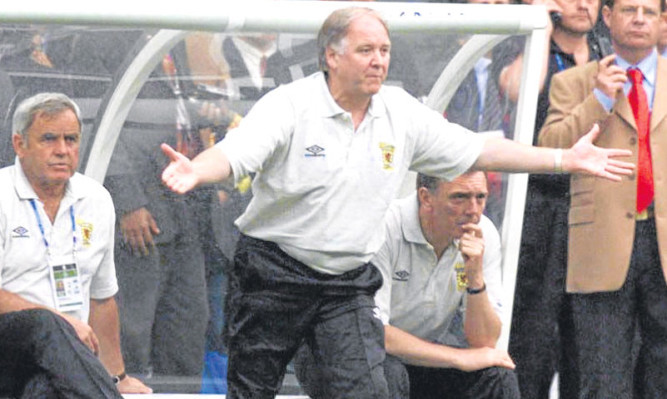
Craig Brown has some big news. “I’m coming out of retirement,” he says, eyes twinkling.
The reporter in me kicks the rest of me up the bum. Hard.
I sit up.
“You’re taking a job?” I ask, already wondering how I’m going to keep this quiet until Sunday.
“Yes,” he replies. “I’m going to be the Scotland manager.”
If he’d left it there, you, at this very moment, would be reading the scoop of the summer and I’d be demanding a pay rise.
Alas . . .
“It’s a charity game at New Douglas Park next Sunday. Frank McAvennie, Andy Goram and Tommy Sheridan are in the squad,” he explains.
“We’re playing against an England side containing Peter Shilton, Ian Wright, Danny Mills and Frank Bruno.
“It’s being filmed for a movie called What’s the Score. I had a meeting about it this morning. I could hardly say no.”
With that, my first question (do you miss football already?) is answered.
Three months ago, Brown brought his extraordinary 55-year career to an end when he retired as manager of Aberdeen.
So for the first time since 1958, a new season will dawn without him in a dressing-room somewhere.
Now, looking back over everything, one word pops up in conversation again and again.
“Privilege.”
It’s an appropriate word for a man so modest and he uses it with bankable regularity.
Such talk has earned him a reputation as one of football’s most universally-liked and respected figures.
But to submit to the idea that he has succeeded passively is to fail to give credit where credit is due.
You don’t survive in management for as long as Craig has on good fortune alone.
Even so, at the tail end of the first summer in more than half-a-century that has belonged to him rather than to football, Brown, as ever, is as reluctant to bask in his achievements.
“My father always said you should have more in your locker than you let on,” he says.
“So I’ve always subscribed to the notion that you should underplay your hand.
“Don’t talk about what you’re going to do or what you have done because, if you’re bombastic at all, you’ll eventually come a cropper.
“If you say what you’re going to do and you don’t do it, you look stupid.
“Similarly, if you’re going about saying I’ve done this and I’ve done that, you look conceited and that’s the last thing you want to be.
“For me, the crux of it is, when your hobby is your job, what a privilege your life becomes.
“As an assistant manager and a manager, I had the best seat in the house for decades.
“Imagine that. Right at the side of the pitch, having an influence on the game and getting paid for it.
“The money wasn’t a concern to me, I must admit. I never had an agent.
“But the privilege of being involved in professional football? It’s fantastic.”
In retrospect, Brown’s CV makes for impressive reading.
Each Scottish national team he was involved with, no matter the age group, went further in competition than they had gone before or since.
In 1987, the Under-20s reached the quarter-finals of the World Youth Championships in Chile.
In 1989, the Under-16s were runners up in the World Cup.
In 1992, the Under-21s reached the semi-finals of the European Championship.
Meanwhile, at senior level, he was involved in three World Cup Finals and two European Championships.
In the years since Craig took Scotland to the World Cup Finals in France in 1998, nobody has come close to replicating his success.
It was work he enjoyed. So with the new season just around the corner, is there a sense in which he feels he could still be doing the job?
“I’ve definitely thought about it,” he admits.
“Pre-season is hard for a manager.
“But it’s also the time when the atmosphere within a club is best because you haven’t picked a team yet. Nobody’s dropped.
“Every one of your 20-odd players feels he’s in contention, so the atmosphere is terrific.
“So at this point, I suppose there is a sense that it would be nice to be there on a daily basis because the humour is at its best.
“But I’ve enjoyed my summer. I’ve been on holiday with my family, which is something I haven’t been able to do often.
“I’ve had time to play golf badly and I’ve also taken in a couple of Aberdeen’s pre-season games.
“So I’m still in touch, though not as directly as before.”
Like all of his old clubs, Brown holds Aberdeen in great affection, and the feeling is mutual.
After signifying his intention to retire, he was offered and accepted a non-executive directorship at Pittodrie.
It’s a role he believes will keep him busy, but he insists it will not lead him to offer advice to the Dons’ new management team of Derek McInnes and Tony Docherty unless he is asked.
“I wouldn’t dream of interfering in what Derek and Tony are doing,” he says.
“There’s a great phrase in the game of football the easiest team to coach is somebody else’s.
“Everybody’s an expert on other people’s teams.
“That’s just the way of it.
“You can look at everybody else’s team and say: ‘Christ, look at that!’
“But you look at your own and sometimes your hands are on your head.
“I’m very much away from that now, though of course my door will always be open.
“I have great affection for football management as a job.
“Doing it for so long has been a privilege.
“But the time was right to stop.”

Enjoy the convenience of having The Sunday Post delivered as a digital ePaper straight to your smartphone, tablet or computer.
Subscribe for only £5.49 a month and enjoy all the benefits of the printed paper as a digital replica.
Subscribe